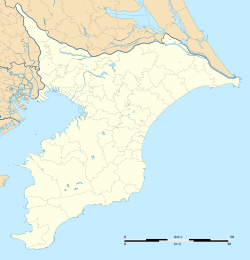Top Qs
Timeline
Chat
Perspective
Narita Airport Terminal 1 Station
Railway station in Narita, Chiba Prefecture, Japan From Wikipedia, the free encyclopedia
Remove ads
Narita Airport Terminal 1 (Narita Airport) Station (Japanese: 成田空港(成田第1ターミナル)駅, romanized: Narita Kūkō (Narita daiichi tāminaru)-eki[1]) is an underground airport rail link station located beneath Terminal 1 of Narita International Airport in Narita, Chiba, Japan. The station is shared between East Japan Railway Company (JR East) and the private railway operator Keisei Electric Railway.
Remove ads
Remove ads
Station layout
Summarize
Perspective
The JR East portion of the station has one island platform. The Keisei portion of the station has two island platforms: one serves one track (No. 1) and the other serves two. Each of the two tracks of the latter has two positions for trains, which are separately numbered (one is numbered 2 and 4, and the other is 3 and 5). On 17 July 2010, the Keisei Line platforms and concourses were segregated: one portion is for Narita Sky Access Line trains (including Skyliner limited express services) and the other portion for Keisei Main Line trains. Passengers traveling only on the Keisei Main Line must pass through an additional ticket barrier prior to entering the platforms, so as to enforce the separate fare structure that will be in place for Narita Sky Access Line trains.[2]
JR East
| 1 | ■ Narita Line | Limited Express Narita Express for Tokyo, Shinjuku, Omiya, and Yokohama |
| 2 | ■ Narita Line | for Narita, Chiba, Tokyo, Yokohama, and Kurihama (via JO Sobu Line (Rapid) and Yokosuka Line) |
The station has a Midori no Madoguchi staffed ticket office.
Keisei Electric Railway
| 1 | KS Narita Sky Access Line | Access Express trains for HS Hokuso Line, Nippori, Keisei Ueno, and Oshiage A Toei Asakusa Line for Asakusa, Nihombashi, and Shimbashi KK Keikyū Line for Shinagawa and Haneda Airport (International Terminal and Domestic Terminal) |
| 2, 3 | KS Keisei Main Line | for Keisei Narita, Keisei Funabashi, Nippori, Keisei Ueno, and Oshiage A Toei Asakusa Line for Asakusa, Nihombashi, and Shimbashi KK Keikyū Line for Shinagawa and Haneda Airport |
| 4, 5 | KS Narita Sky Access Line | Airport Limited Express Skyliner for Nippori and Keisei Ueno |

Remove ads
History
Originally built for the planned Narita Shinkansen, the station opened on 19 March 1991.[3] Before this, there was also a station named Narita Airport Station, which was served only by Keisei and connected with the airport terminal by bus. The former station was renamed Higashi-Narita Station on the same day the present airport station was opened.
On 17 July 2010, the same day that Skyliner limited express services began operations on the Narita Sky Access Line, the layout of Keisei Line platforms and concourses was changed. For details, see "Station layout" section above. The station also received a station number for Keisei services on that date; Narita Airport Terminal 1 Station was assigned station number KS42.[4][5]
Remove ads
See also
References
External links
Wikiwand - on
Seamless Wikipedia browsing. On steroids.
Remove ads





